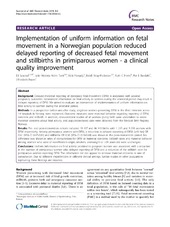Implementation of uniform information on fetal movement in a Norwegian population reduces delayed reporting of decreased fetal movement and stillbirths in primiparous women - a clinical quality improvement
Saastad, Eli; Tveit, Julie Victoria Holm; Flenady, Vicki; Stray-Pedersen, Babill; Fretts, Ruth C.; Børdahl, Per E.; Frøen, J. Frederik
Peer reviewed, Journal article
Published version

Permanent lenke
https://hdl.handle.net/1956/9297Utgivelsesdato
2010-01-04Metadata
Vis full innførselSamlinger
Originalversjon
https://doi.org/10.1186/1756-0500-3-2Sammendrag
Background: Delayed maternal reporting of decreased fetal movement (DFM) is associated with adverse pregnancy outcomes. Inconsistent information on fetal activity to women during the antenatal period may result in delayed reporting of DFM. We aimed to evaluate an intervention of implementation of uniform information on fetal activity to women during the antenatal period. Methods: In a prospective before-and-after study, singleton women presenting DFM in the third trimester across 14 hospitals in Norway were registered. Outcome measures were maternal behavior regarding reporting of DFM, concerns and stillbirth. In addition, cross-sectional studies of all women giving birth were undertaken to assess maternal concerns about fetal activity, and population-based data were obtained from the Medical Birth Registry Norway. Results: Pre- and post-intervention cohorts included 19 407 and 46 143 births with 1 215 and 3 038 women with DFM respectively. Among primiparous women with DFM, a reduction in delayed reporting of DFM (≥48 hrs) OR 0.61 (95% CI 0.47-0.81) and stillbirths OR 0.36 (95% CI 0.19-0.69) was shown in the post-intervention period. No difference was shown in rates of consultations for DFM or maternal concerns. Stillbirth rates and maternal behavior among women who were of non-Western origin, smokers, overweight or >34 years old were unchanged. Conclusions: Uniform information on fetal activity provided to pregnant women was associated with a reduction in the number of primiparous women who delayed reporting of DFM and a reduction of the stillbirth rates for primiparous women reporting DFM. The information did not appear to increase maternal concerns or rate of consultation. Due to different imperfections in different clinical settings, further studies in other populations replicating these findings are required.
Utgiver
BioMed CentralTidsskrift
BMC Research NotesOpphavsrett
Copyright 2010 Saastad et al; licensee BioMed Central LtdEli Saastad et al.; licensee BioMed Central Ltd.
